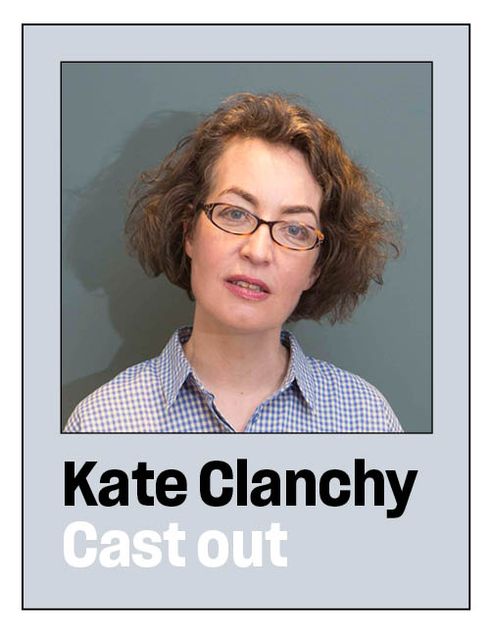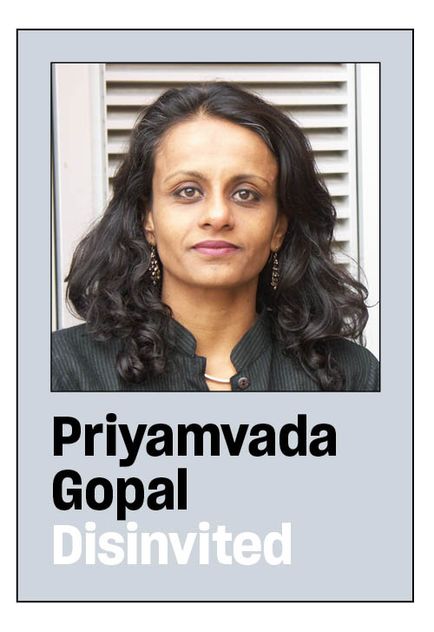What happens when your words are deemed—rightly or wrongly—to be beyond the pale? We asked three people who found themselves “cancelled” for things they have said or written to tell us about their experiences. We also examined 24 other cases where prominent people have likewise been sacked, uninvited or otherwise made into a pariah. Are these cancellations justified? Some more than others, perhaps—but what does their frequency say about us?

I have no doubt that the critic who wrote of my book on Twitter “that so many powerful people in publishing, in the press, in British establishment are doubling down on this book fills me with terror. How much time before another teacher takes callipers to a child? How much time before another child must be smuggled out to be kept safe?” was perfectly sincere as she typed, and believed that she had somehow discovered a fascist and was saving a child.
I am also sure that the English teacher who wrote: “Shout out to every white person who is bereaved, caring for the dying, grieving… yet who somehow doesn’t manage to do a racism. Yes, this is another Clanchy tweet” was motivated by passionate anger, and went back to teaching Lord of the Flies, The Scarlet Letter and Shirley Jackson’s The Lottery almost satisfied that none of those texts had anything in common with the words she had just used. (Both my parents died in January 2021, and I had written about it for the Guardian.)
And sincere and righteous too, of course, were the thousands of reading, thinking people who agreed with and retweeted both those views, who allowed those exciting, lurid images, of the teacher torturing a child with callipers and the bereaved woman who shits racism, to live in their mind and gleam on their phones.
Our phones, though, are intimate, and on them glows a precious version of ourselves. If you write such drastic language—especially if in life you would hesitate to mock someone’s bereavement to their faces or accuse them of violent sadism—a doubt will probably follow. Who am I if I write such things? On the other hand, who am I if I don’t? The doubts, like the images, will be alive, intimate and painful, sending you back to Twitter for more reassurance and comradeship.
Read Fintan O'Toole’s cover essay on cancel culture here
A contrary argument won’t soothe you at this point, and nor will an apology. Both these tweets were posted and retweeted after I had apologised sincerely for using careless language that gave hurt and offence and had undertaken to rewrite them, an apology I very much meant. My 30-year unblemished teaching career is a matter of public record. Far from complaining about me, the young people represented in the book organised themselves to write a letter about the “unequivocal care and support” I had always shown them. But my accusers needed to feel justified in the language they had used and the taboos—such as mocking bereavement—they had crossed, so they needed me to be a monster, not an apologetic writer, and continued to construct me in that way.
Ostracisms are a basic, human, social mechanism. People have always needed to fight and kill, and rid themselves of burdensome people; therefore we have within us the capacity to join with others to blot out rationality and empathy. It’s particularly human to use imagination and words to refresh bonds, excite ourselves and dehumanise the target. Social media isolates that imaginative and linguistic process and speeds it up. The call is powerful. Crowds are rapidly drawn to the festival of invective. Even people determined not to be involved are made into pressured, guilty, witnesses. Everyone feels helpless, and anxious, and urgent, because they are gearing up to kill.
Which of course they will not. This is only words, only Twitter, and we are talking about books. Or will they? The thing that most astonished me about the experience of being cancelled was the strength, clarity and immediacy of the suicidal ideation. It took shape by my every action: in the bathroom, telling me to reach for the razor blade; by the side of the road, telling me to walk into the traffic; in the river while I was swimming, telling me to sink. I had never met this force before, but everyone who has been through an ostracism agrees the shadows coalesce for them, too, as an inevitable part of the cycle, the shape of our collective shame. I feel a strong need to tell people about this. The culture wars are only just getting going in British publishing. As they progress, someone will certainly die, because writers are susceptible types who live by their word. When this happens, it will be because many people acted with passion and sincerity from their deeply held beliefs.
In the UK and Ireland, Samaritans can be contacted on 116 123 or email jo@samaritans.org or jo@samaritans.ie. The charity Mind is available on 030 0123 3393 and Childline on 0800 1111

A university is a Socratic haven of free thought: a sanctuary where any question, however searching, can be asked; any hypothesis, however outlandish, can be entertained for argument’s sake; any opinion, however unpopular, can be considered—and politely shot down. “Let a hundred flowers bloom, let a hundred schools of thought contend.”
Should lesbian sisters be allowed to marry each other? To ask the question is not to express an opinion. It’s an invitation to think, to argue, to contemplate, what is actually wrong with incest? With anything? It’s an invitation to do what universities do. Or should.
A petri dish in an IVF clinic contains a clutch of conceptuses. One of them will be chosen for implanting. Should the choice be random? Or might the couple choose the sex of their child? Should they be allowed to select for intelligence? Musical ability? Athletic promise? OK, that’s your essay for next week.
No it isn’t. The professor who set that essay would be reported for “offending” students, making them feel “unsafe.”America’s tragic history of slavery and rape—and the prevalence of mixed marriages today—have ensured that race is a spectrum. This rich interracial range would seem to offer plenty of scope for identifying as whatever you please. That might lead some to argue that the racial rainbow is there for your choosing: feel free to identify as whatever “race” you like. Or to do as I do and write in “human.”
But what about your sex? When two people of different colour mate, their offspring is mixed race. When a male and a female mate, the offspring is not a hermaphrodite. Discuss.Gender dysphoria is a thing. There are people who feel a profound mismatch between their sex chromosomes and their mind. Some decide, after mature consideration, to take the courageous plunge, inject hormones and undergo drastic surgery. We have to respect their bravery, and politely address them by their preferred pronouns. But if an individual with a penis truculently demands that we change our language and positively assert that she actually is a woman is a woman is a woman? Well, what does the class think? In 1996, the American Humanist Association named me their Humanist of the Year. The 2021 board of directors rescinded the honour. Why? Because of this tweet:
In 2015, Rachel Dolezal, a white chapter president of NAACP, was vilified for identifying as Black. Some men choose to identify as women, and some women choose to identify as men. You will be vilified if you deny that they literally are what they identify as. Discuss.
I don’t apologise. After a lifetime as an Oxford tutor, old habits die hard.

Let me be upfront: I think “cancel culture” is a conservative confection, a pseudo-phenomenon coined to foment the moral panics regularly whipped up by the political right. Unfortunately, the term has also been given legitimacy by some of a liberal disposition who are unwilling or unable to assess the truth value of hyperbolic claims that there are routine and endemic “cancellations,” especially in universities, of people who are “not politically correct.” Close examination reveals that criticism, challenge and protest in their own right are frequently labelled “cancellations,” while actual cases of “no-platforming” are quite rare.
How do I square this assertion with the fact that in the last year alone I myself have had direct experience of two blatant attacks on freedom of speech? The first was the arbitrary dissolution of my Cambridge college’s working group on Winston Churchill, race and empire, set up to examine the less glorious side of its founder, Churchill. This cancellation happened after vicious attacks by the right-wing think tank Policy Exchange, which was set up by Michael Gove, a current government minister, as well as tantrums from Churchill’s heirs. References were made to wealthy donors being upset. A discussion series on Churchill that I was involved with was also halted.
My second cancellation was touted as a victory by the right-wing website Guido Fawkes, which announced that my invitation to talk at the Home Office on my book, Insurgent Empire, had been rescinded at its behest. Forty-eight hours before I was due to speak to Home Office employees about black anticolonial campaigners for Black History Month, I received an email calling it off. Guido suggested the reason was that it had brought to the Home Office’s attention a tweet from last year in which I noted that, historically, many Asians in Africa had developed anti-black attitudes because they were deployed in imperial “divide-and-rule,” and that that legacy was reflected in some of the actions of Home Secretary Priti Patel, whose parents grew up in Uganda. This, according to Guido, was a “racist” remark that earned me a justifiable “no-platforming.” It has since emerged that the Cabinet Office has ordered “due diligence” on any potential outside speakers to determine if they are deemed “political… or have spoken against key government policies.”
To me these cancellations are not evidence of a new and dangerous “cancel culture” enforced by a censorious left and over-sensitive young people. It speaks instead to a more entrenched reality, in which right-wing political interests foment “culture wars” through which to discredit ideas deemed subversive. In parallel, they seek to give discredited and bigoted ideas the patina of freshness by claiming that they are suppressed by “cancel culture.”
This is a reality in which anti-racists can be casually deemed “the real racists” and cancelled accordingly. It is a reality in which it is acceptable for ministers to fulminate against teaching anti-capitalism or critical race theory, while spouting homilies to free speech on campus. It is a reality in which the status quo of wealth and power has long determined who gets a platform and who does not. It is a reality in which you don’t have to be actively de-platformed, as I was by the Home Office and Guido Fawkes: mostly, you are just never invited in the first place.













